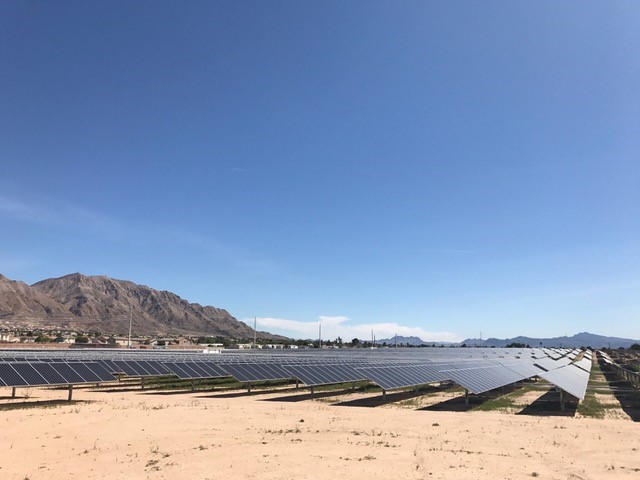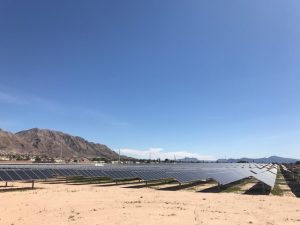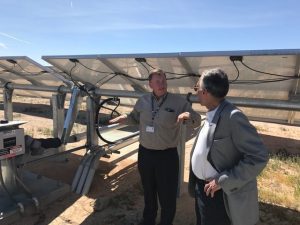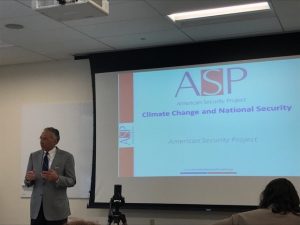
Climate Change and National Security in Nevada
ASP organized a trip to Las Vegas, Nevada to discuss the threat climate change poses to local, national and global security. ASP’s BG Stephen Xenakis spoke to local government and business leaders, providing the military perspective on why addressing climate change is critical to our national security. Gen. Xenakis was joined by Dr. Maureen McCarthy, a Senior Research Faculty in the Department of Physics, University of Nevada, Reno and in the Division of Earth & Ecosystem Sciences at the Desert Research Institute and Graduate Faculty in Hydrologic Sciences.
Prior to beginning programming, Gen. Xenakis and Dr. McCarthy toured the Nellis Air Force Base’s solar installations. The base currently has two photovoltaic power stations; the first 13-megawatt system inaugurated in 2007 and the second 15-megawatt system, in 2015. Constructed on a capped landfill, the system created about 150 jobs during construction and now provides clean, reliable energy to the base. The base runs on about 50% renewable energy year-round and during peak summer usage, the base uses all 28 megawatts of solar energy. An added benefit is that if the base doesn’t need the full 28 megawatts, the extra electricity is sent back onto the grid.

Nellis Air Force Base’s Solar Array
One of the tour guides, the Director of Community Partnerships, explained that for him, investing in solar just made sense. The base is vulnerable when it relies solely on the fragile, local grid; and with over 300 days of sun a year, solar boosts the base’s overall energy security. In addition to the solar array, the base has invested in other energy saving measures including switching to LED light bulbs in their stadium, saving the base hundreds of thousands of dollars a year. The long-term plan is to be 100% off the grid to further enhance the base’s security.

BG Stephen Xenakis Hears from NV Energy Representative
The beginning of programming was held at Las Vegas City Hall, a newly built, highly efficient, and LEED Gold certified building. The Las Vegas City Manager opened the event with a short overview of the impressive work being done to increase efficiency. Las Vegas has invested over $60 million to reduce emissions by 1/3 compared to 1990. Already they have installed 60 megawatts of solar, reduced energy costs, and saved over 200 million gallons of water a year while also expanding parks and other programs. This work provided a great introduction into the multi-layered benefits of investing in resilience and energy security.
Gen. Xenakis began by giving an overview of how climate change impacts the security of our nation and why it’s a strategic, not a political, issue. He cited a recent trip to Mauritania and the visible challenges that people face daily. With the desert expanding, population growing and human security decreases, Gen. Xenakis pointed out that it’s understandable why this region faces growing concerns over instability and terrorism. He closed by highlighting how the ability to respond to these growing threats is fundamental to our country’s broader national security strategy.

BG Xenakis presents to a group at Las Vegas City Hall
Dr. McCarthy followed Gen. Xenakis with a scientific review of the existing and predicted changes the region faces due to climate change. Citing a 2 degree increase in temperature in Nevada over the last century and increases in extreme precipitation (both drought and flood), Dr. McCarthy stressed that climate change is happening here and now. The event concluded with a question and answer section during which leaders of the community asked the General and Dr. McCarthy to expand on their points.
The second half of programming included a discussion with a group of local top tier CEOs and an exclusive interview on Nevada’s local radio station, KNPR, during which Gen. Xenakis expanded on his discussion about the clear implications of climate change for security. The full interview with KNPR is available here.
For more information on ASP’s work on climate change and security, click here.






